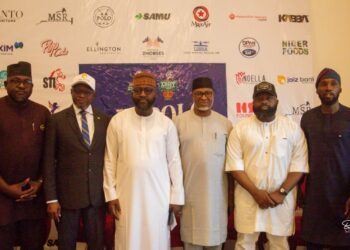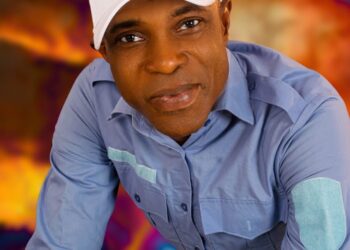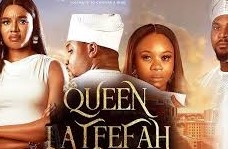The Lagos Poetry Festival, when you think about it, is kind of tautology. What is Lagos if not poetry, and is there a word that better describes the vast and vibrant city other than festive? Still, the more artistically inclined gathered to celebrate the craft by turning their attention to emerging and established poets alike. Among the voices bouncing off the walls at Terra Kulture and the African Artist Foundation was that of Wayne Samuel, a finalist in the festival’s highly competitive poetry slam. Following Wayne’s work through the years, his War of Words dominance, and his quirky social media content, it was nice to finally see him in the flesh. And although he didn’t take home the top prize, it was evident to all why he was among the chosen few to grace the slam and the festival’s main stage. So much so that he was arguably the highlight of the proceedings.
In a city as vibrant and extroverted as Lagos, Samuel’s spoken word poetry runs on undercurrents rather than the loud, brash waves that dominate the Nigerian poetry scene. His cadence, coupled with meticulous attention to rhythmic structure, invites reflection on the depths of a river rather than eliciting the surface-level reactions of a big splash. His voice, subdued yet commanding, beckons the listener to pause, listen, and ponder, which is nice, especially in a society that thrives on noise and spectacle.
Samuel’s final poem in the slam, titled “The VN,” is an evocative elegy for an absentee father. With simple yet intricate multisyllabic rhyming, he situated the audience in a poignant scene, “…you’re probably sleeping, you’re probably dreaming and I’m eyes wide open sending you a VN, but Carpe Diem I’ve got to tell you how I’m feeling…” As the poem progressed, Samuel’s voice carried the weight of unresolved pain, confessing, “I’ve become the sorority leader of young adults with daddy issues.” He returns to this well often, but soon comments on the act of writing itself: “I was grabbing paper instead of grabbing tissues,” blurring the boundary between art and the artist’s lived reality.
It is difficult to know where Wayne Samuel draws inspiration, still there are similarities with Akwaeke’s work here, the slow unmooring of institutions. There are also echoes of the postmodern sensibilities of Robert Coover, self-aware art. “…so I take heel instead of healing, I fake real instead of reeling out of control which is how I’m actually feeling. I can’t deal, but I’m dealing.” He ends with a haunting realization, “I don’t know what I want, I just know that I don’t have it.”
A few days later, Wayne took to the festival’s grand stage, transformed. In his poem “The Lover,” he delves into Nigeria’s socio-political decay through the lens of a romantic relationship between a young man and a professional sex worker. The poem begins with the veneer of scandal, as the protagonist navigates the complexities of love and infidelity: “I can’t deny that I believed the lie that I could let her dine with another guy, knowing her lipstick was the red of wine, and he sipped it.” It’s a sleight of hand of course, what he really intends to speak upon, is the state of the nation.
“They say love is the answer so I stopped asking questions,” Samuel intones, capturing the resignation of a generation disillusioned by broken promises. The metaphor crystallizes as the poem shifts from a private affair to a broader indictment of societal ills because this is not just a relationship, this is living in Nigeria. The young man’s entanglement with the sex worker becomes a symbol of the country’s entanglement with corruption, greed, and moral decay.
You know how the poet Chukwumerije makes you think of Achebe’s reserved yet explosive use of language? Well, Wayne makes me think of Stuart Dybek’s work, in which ordinary life collapses into a broader, often darker reality. Samuel deftly transitions from personal intimacy to national allegory. His ability to weave intricate metaphors and explore complex themes with subtlety and grace sets him apart in the small and often homogeneous pond that is Nigerian poetry. “The VN” and “The Lover” are not quite masterpieces, but they certainly suggest that what we’re dealing with here, is a poet and writer who is capable of one.





